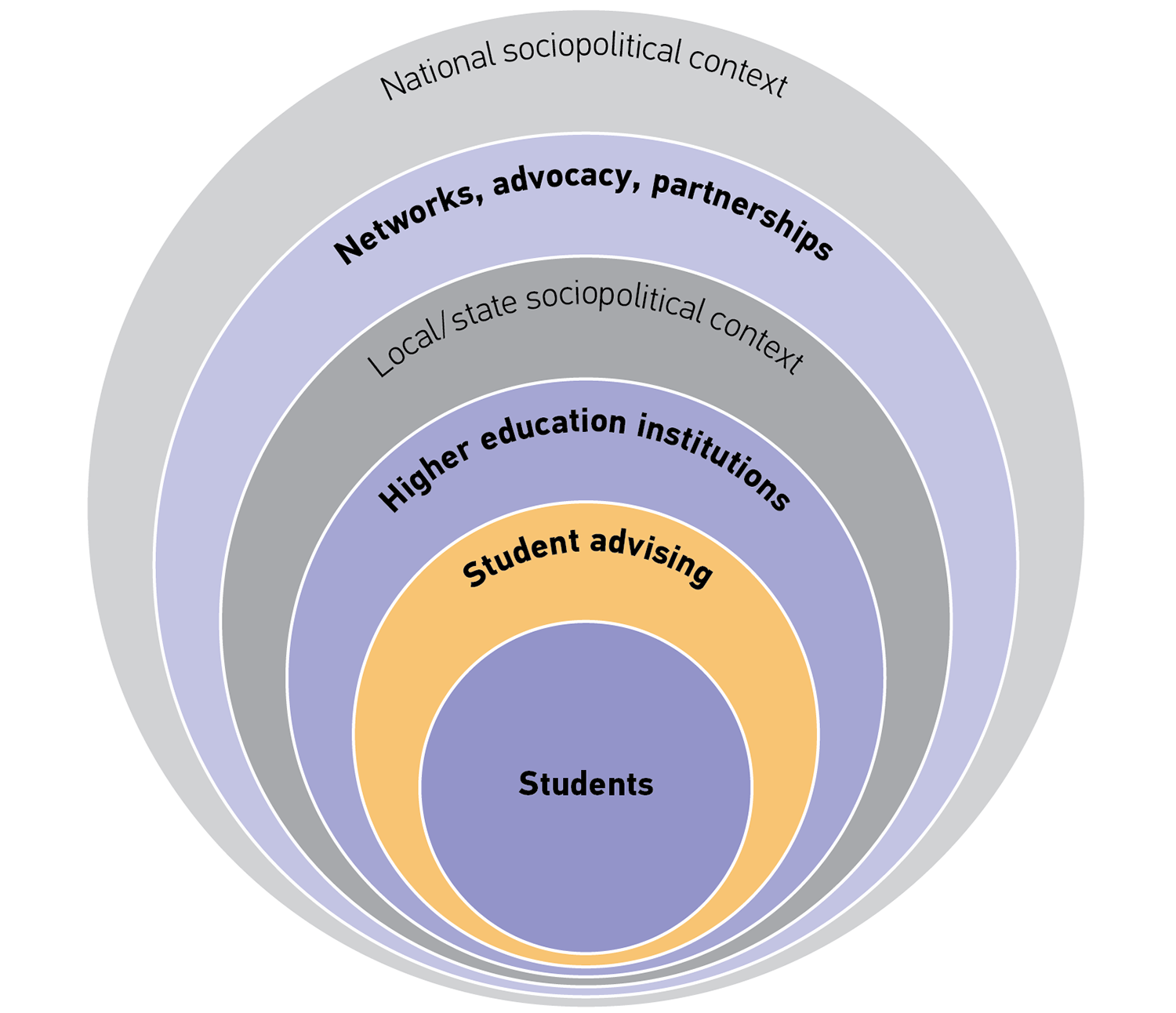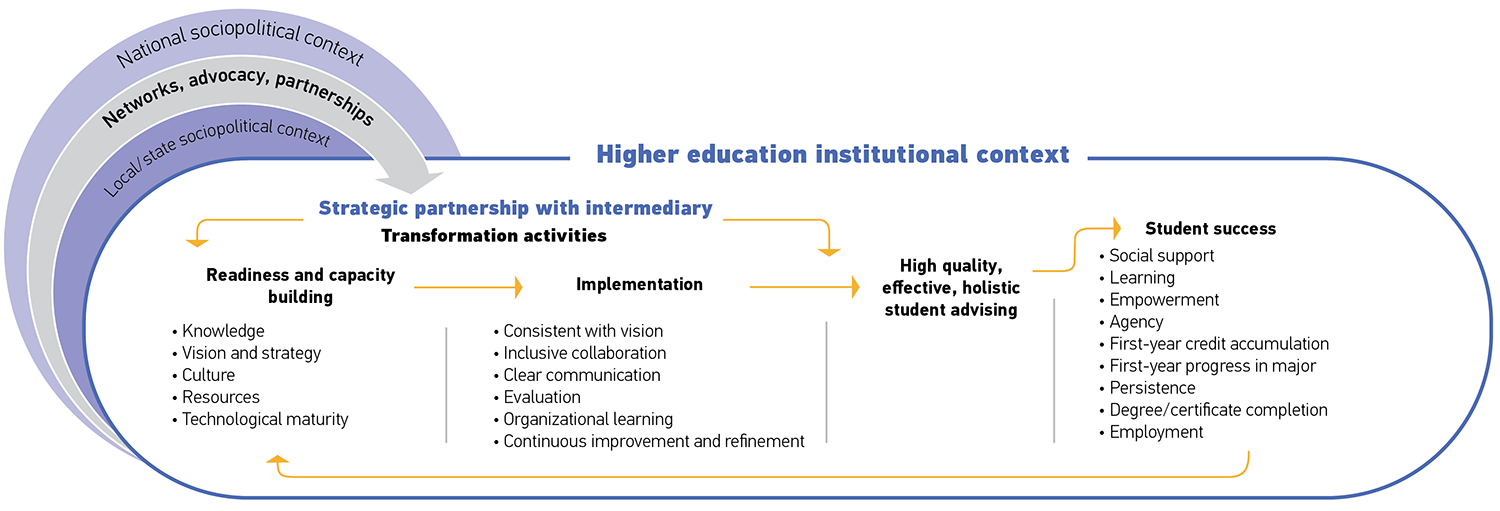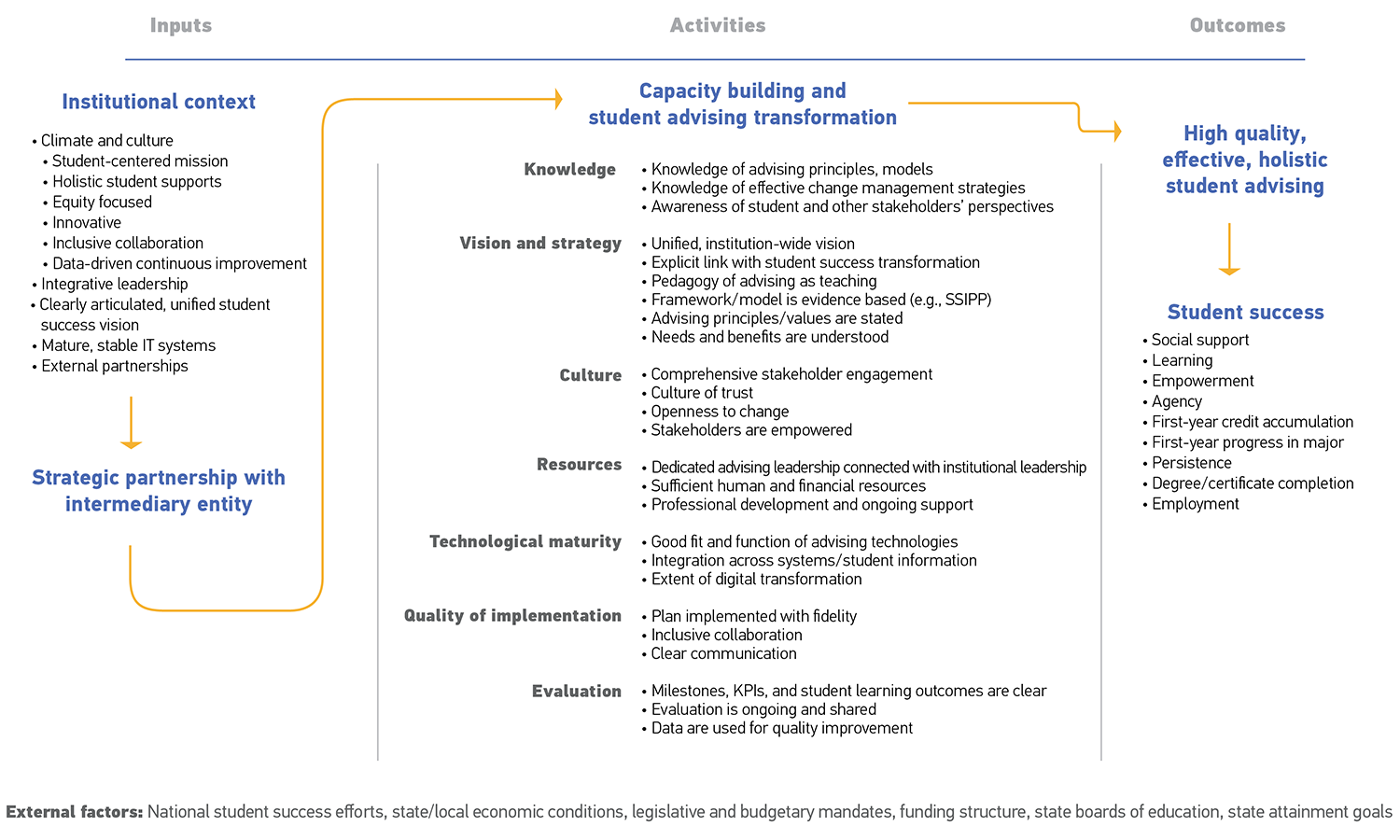In pursuit of identifying promising practices in technology-mediated student advising, we offer theory-of-change and program-logic models that integrate theory and existing research to promote planning, implementation, and testing of assumptions related to student advising transformation.

Accountability measures in higher education have shifted dramatically from enrollment to completion, given persistent disparities in persistence across race, ethnicity, and income.Footnote1 Institutions of higher education across the United States have dramatically increased their investments in technology-mediated advising as a key component of holistic student-support systems. And since 2020, the pandemic has magnified concerns about equity, given resource disparities across students and institutions. Some students struggle to access essential technologies, not only for advising and support services but also for teaching and learning.
Although some exemplary institutions have successfully transformed their student support and advising systems and demonstrated significant gains on key institutional indicators, these improvements have not materialized widely. Similarly, whereas several institutions have notably achieved greater equity in student outcomes and closed equity gaps for racially minoritized, low-income, and first-generation students, attaining greater equity at scale also has been elusive.
The difficulty in scaling advising transformation to improve equity in student outcomes has motivated increased interorganizational collaboration, resource investment, and research to better understand the transformational process and identify promising practices. Numerous funders and intermediary entities have championed higher education student success and advising transformation through networking, advocacy, technical assistance, and research. The Advising Success Network (ASN) is one such solution network. With the mission to identify, build, and scale effective and equitable advising solutions that support all aspects of the student experience, ASN and its partner organizations aim to clarify and promote what is known about "good advising" and offer resources and services to facilitate institutional transformation.
As an ASN partner, EDUCAUSE, in collaboration with others, aspires to develop and share resources to support institutions' advising transformation, particularly related to advising technologies. Challenged to explore best practices in the use of student advising technologies in higher education, our research team looked to the literature and critical friends in the field to begin this journey. Does the literature illuminate a yellow brick road—a single best path—guiding the effective use of technology to promote student advising transformation? If not, can we identify multiple roads that lead to Oz? Or are institutions more or less blazing their own trails to achieve improved and equitable outcomes? In this article, we advance a set of models grounded in the literature and enhanced by theory to guide us on the student advising transformation journey.
What do we mean by best practice? Merriam-Webster defines best practice as "a procedure that has been shown by research and experience to produce optimal results and that is established or proposed as a standard suitable for widespread adoption." In other words, best practice is synonymous with evidence-based practice. We seek best practices to increase our chances of successfully achieving our stated goals—in this case, student advising transformation.
As straightforward as that might sound, identifying best practices is tricky. Student advising transformation is complex and heavily influenced by context, and thus, finding one common path to successful transformation is likely not possible. Given the relative youth of advising transformation, articulating lessons learned in order to suggest promising practices in a more reasonable goal. A critical proposition guiding our research strategy is that we are most likely to identify these lessons learned when we engage all stakeholders, use multiple research methods, and synthesize findings across studies and contexts.Footnote2
Our first step in this undertaking was to scan the existing advising transformation literature. Overall, the research suggests that student advising is associated with positive student outcomes. A recent meta-analysis found that student advising had a positive significant effect on student retention and graduation.Footnote3 Further, the research is beginning to coalesce around factors that may influence effective transformation. For instance, transformation is contingent upon changes in institutional structures, procedures, culture, and attitudes.Footnote4 It also hinges on institutional-level capacities as well as individual-level practices.Footnote5 Themes also emerged regarding potential promising activities. For example, Brown & Kurzweil described four "strategic essentials":Footnote6
- Committing to a student-centered mission and strategic plan
- Collaborating around student success
- Aligning structures, resource allocation, and personnel to the strategic plan
- Using data to continuously improve
Our scan of the literature led to a few key revelations. First, even though student advising transformation has accelerated over the past decade, much of it is not formally evaluated and published in peer-reviewed outlets. Very little, if any, research synthesis has been conducted to date. Second, while some of the literature draws on theory, it typically mentions only a single theory, most often ecological systems theory. Finally, we were unable to find a comprehensive framework or model that synthesizes the research to date and depicts the key causal relationships within successful technology-mediated advising transformation.
The field appears ripe for and in need of deeper and more intentional use of theory. Using theory will not only point to what matters and why but also help us make sense of complexity in real-world advising transformation, particularly by weaving together multiple theoretical perspectives.
Further, developing a framework that integrates theoretical assumptions with a synthesis of the existing advising transformation research can provide a roadmap that can potentially magnify current funding and advocacy initiatives. Such a framework can facilitate consensus in the field and enhance collaboration, planning, implementation, and testing of assumptions related to advising transformation.
In the remainder of this article, we briefly describe relevant theories that, when woven together, enlighten our understanding of the transformation process. Next, we present a set of models that we hope will serve as useful tools to institutions, intermediaries, and other stakeholders engaged in and advocating for student success.
Theoretical Foundations
Growing evidence suggests that theory-based intervention is more effective than initiatives developed in the absence of theory.Footnote7 Further, the strongest interventions draw on multiple, complementary theories.Footnote8 More specifically, integrating theory into program design helps program planners focus their resources and efforts on important targets for intervention.
In this section, we highlight several theories that are relevant to the design, planning, and implementation of technology-mediated student advising transformation. We hope this brief review inspires readers to think about what practices are likely to be critical in making a difference in the overall transformation process.
Ecological Theory. Ecological systems theory provides an overarching framework within which to integrate relevant theory.Footnote9 Ecological theory highlights the importance of both personal and environmental influences, as well as the dynamic, reciprocal, and transactional influences between contexts (i.e., ecology) and systems (e.g., intrapersonal, interpersonal, family, community). The application of ecological systems theory to student supports transformation is depicted in figure 1. Students are depicted in the center, indicating the purpose of holistic student supports to promote student success. Student advising transformation is influenced most directly by the systems (e.g., stakeholders such as advisors, peers, faculty) that are engaged and the interactions between them. Transformation is also influenced by formal and informal social structures, as well as the culture and subcultures of the institutional and local contexts (e.g., economic, legal, social, political). As one moves outward, influences are less direct. Student support advocates and networks have formed and influence the resources (e.g., funding, tools, research) available to institutions. Some institutions formally partner with intermediary organizations to build readiness and capacity, thereby increasing their influence. Given these complex influences, advising transformation that targets multiple levers across levels is more effective.Footnote10 Although ecological theory has been cited in the redesign of college advising, first-year student success in community colleges, and campus peer culture, the theory has been underutilized in advising and student success transformation.Footnote11

Social Support Theory. Social support generally is considered to consist of four types of support:Footnote12
- Emotional—care, encouragement, respect, trust, value
- Instrumental—concrete resources, services, financial support
- Informational—advice, guidance, problem solving
- Appraisal—sense of social support, social integration, inclusion
While linked to the effectiveness of student advising, social support theory has been more often associated with student success interventions more generally.Footnote13 For example, it has been used to examine first-year student adjustment, commitment, and retention for racially minoritized, underrepresented, and nontraditional students.Footnote14
Organizational Development Theory. Organizational development theory offers insight about the influence of institutional culture, learning, and knowledge management on student advising transformation. Higher education institutions are incredibly diverse, and as a result, contexts, access to resources, and change management can differ substantially across the institution. Snowden and Boone asserted that leadership and change management strategies must fit the complexity of the context.Footnote15 In simple contexts, adopting best practices is more effective. When environments are complex, as in institutions of higher education, effective leadership strategies include creative thinking, inclusiveness, diversity, communication, and collaboration. This suggests that lessons learned about student advising transformation should be shared not as literal but rather as examples, within contexts, to stimulate innovative thinking.
Interorganizational Relations and Network Theories. These theories emphasize the importance of clear, mutually shared goals, values, and interests; collaborative inquiry; and rapid-cycle analytics (i.e., plan, study, act, do). Open, collaborative networks have been shown to facilitate the spread of innovation; lack of connection challenges communication and collaboration. Further, exemplars aid understanding. Given how diverse institutions are, with multiple departments, colleges, campuses, and so on, these theories are applicable within institutions as well as across institutions.
Connectivism. Exponential growth of technology has changed how we learn. Learning is often informal and vicarious. As we are bombarded with information, we must find meaning in what often seems like chaos by making connections, recognizing patterns, and synthesizing across information sources. Leadership and performance in these fast-paced environments require flexibility and innovation. Learning is aided by diversity and inclusion.Footnote16
Table 1 summarizes the key concepts of the theories discussed here.
Table 1. Key Theoretical Concepts
| Theory | Key Concepts |
|---|---|
|
Ecological Systems Theory |
|
|
Social Support |
|
|
Organizational Development |
|
|
Interorganizational and Network Theories |
|
|
Connectivism |
|
A Framework to Identify Lessons Learned and Promising Practices
Theories of change and logic models are tools used to aid project design, planning, implementation, and evaluation. They illustrate how we think change occurs. They synthesize multiple if-then relationships—for example, if we have X resource, then conduct Y activity, it will result in Z outcome. The difference between theories of change and logic models is in how much detail is presented.
Theories of change are abstract, primarily theory-driven, and generalizable across settings. In contrast, a logic model usually depicts how a theory of change is operationalized in a specific context. They typically describe the needed inputs (resources), activities, and expected outcomes for a specific initiative.
Next, we offer both theory of change and logic models for technology-mediated student advising. The models are related and progress from linking general concepts in the theory of change to drilling down to more detail about what matters in the logic model. More specifically, the logic model identifies findings from the research literature that link specific institutional context and transformational process factors to successful advising redesign.
Theory of advising transformation. Our theory of advising transformation (see figure 2) melds concepts from the theories reviewed earlier with the existing literature. We have situated the advising transformation process within an institution yet pointed to the influence of external contexts (e.g., local, state, and national sociopolitical contexts) that we know are important from ecological systems theory. The model further posits that the intentional process of readiness and capacity building facilitates successful advising transformation. An institution's strategic partnership with an external intermediary organization for the purpose of strengthening institutional readiness and capacity may serve as an important lever of change facilitating student advising transformation. It follows that effective transformation leads to high-quality, effective, holistic student advising, which ultimately leads to improved student outcomes. Finally, the model also depicts the transformation process as ongoing, iterative, and additive. It is key to understand this model as a theoretical one. In contrast, the logic model provides a clear roadmap suggesting specific structures and actions needed to support transformation.

Advising transformation logic model. The logic model (figure 3) expands on the theory of change by providing more detail about what factors may be most important in the transformation process, based on what we know from existing research. We have organized the logic model in the traditional way by linking inputs, activities, and outcomes. Inputs are resources required for transformation and here include the institutional context and resources, as well as the partnership with the intermediary organization. Activities are the actions undertaken as part of the transformation process. Outcomes reflect the ultimate goals of the advising transformation.

Critically, this model synthesizes the existing research about what specific institutional contextual inputs and transformation processes research has suggested are associated with successful student advising transformation. On the left of the model under inputs, key aspects of the institutional context that enable successful transformation include supportive culture, integrative leadership, mature and stable IT systems, and a clear unified student success vision. The model also suggests that a strategic partnership with an external intermediary may enhance transformation readiness and capacity building, which in turn support successful transformation. In the center of the model, under activities, capacity building aims to strengthen stakeholders' knowledge, vision and strategy, culture, resources, and technological maturity. Further, the quality of implementation and ongoing evaluation reinforce transformation success. Finally, successful transformation strengthens high-quality, effective, holistic student advising, which leads to student success.
Discussion
This article presents theory of change and logic models to facilitate the planning, implementation, evaluation, and continuous improvement of technology-mediated student advising in institutions of higher education. Importantly, these models provide a framework or roadmap to guide our exploration for lessons learned and promising practices in advising transformation. Their value comes from articulating what elements may be essential to ensuring that transformation in fact leads to positive student and institutional outcomes. While grounded in theory and existing evidence, the relationships depicted in the models are assertions. Further research is needed to test the presence of these relationships and uncover which, if any, are more important to realizing positive outcomes, growth, and equity for all students. Moreover, we see the models as works in progress to be further developed with input from the field and informed over time by additional research.
Several promising practices as levers for transformation emerge from the literature and are supported by theory:
- Stakeholder engagement
- Diversity and inclusion
- Mutually shared goals and values
Critically, not only are these interconnected, but they may also be essential for transformation success. Stakeholder engagement alone is not sufficient. It matters who is included and how. All stakeholders, with diverse views and backgrounds, ultimately need to be meaningfully included throughout the transformation process but particularly upfront in order to truly arrive at mutually shared goals and values. For example, to be maximally effective and equitable, all stakeholders should inform the definition of success. Given stakeholders typically have different ideas of what success looks like, who defines success matters. Who defines the criteria by which promising practices are identified also matters because any criterion is ultimately value-based and can vary across sources and perspectives. Without diversity and inclusion, definitions of success and identification of promising practices can be biased, skewed toward dominant perspectives and resource-rich contexts.
Thus, equitable transformation practice suggests that strategic effort should be directed at engaging stakeholders from the beginning with specific outreach to stakeholders who tend to get left out, such as students, faculty, advisors, IR, and IT staff. It is critically important to anticipate where views may be most divergent or at risk of not fully aligning with the value and principles of transformation. Although IT leaders and their staff are critical stakeholders, their full engagement in the transformation process likely has been undervalued and poorly conceptualized. Not only does technology play an essential role in providing tools to facilitate student advising, IT principles (e.g., connectivity and interoperability) have implications for readiness, capacity building, and the transformation process. IT leaders and their staff are critical players who need to be engaged throughout the process. Even so, careful planning and facilitation need to address multidisciplinary differences in training, language, roles, and approaches in order to ensure that tool functionality and use are aligned with the vision for student advising transformation. Institutional-level structures, procedures, culture, and tools must align with individual's attitudes, perceptions, and behaviors. For instance, advisors may underutilize technology they see as inconsistent with their values, roles, and advising principles. Guided by evidence- and theory-informed tools and facilitation, institutions can proactively build consensus and buy-in from all stakeholders, thereby ensuring that there is commitment to mutually understood transformation goals and values.
As mentioned previously, we are most likely to identify advising transformation promising practices and lessons learned when we engage all stakeholders, use multiple research methods, and synthesize findings across studies and contexts.Footnote17 We have proposed theory of change and logic models as one way to synthesize the existing technology-mediated advising transformation literature.
Research is needed that explores the contribution of intermediaries in readiness and capacity building as well as effective advising transformation. Organization development, diffusion of innovation, and network theories provide support for the potential benefit of engaging intermediaries in advising transformation. While partnerships with intermediaries have proliferated over the past several years, very little description and exploration of this approach is currently available in the literature related to student success transformation in institutions of higher education.
We also advocate for expanding theory-driven research using multiple and innovative methods designed to further explore the mechanisms of change hypothesized in the models presented in this article. For example, we have proposed student social support as a bridge linking advising structures and practices to more distal student success outcomes. While some student success literature does center on social support, it does not contextualize it as a necessary ingredient in transformation success. Future research also should distinguish among the types of student social support. For instance, advising systems that predominantly provide instrumental support (e.g., concrete resources such as information and services) may not be enough. In contrast, are advising systems that provide all four types of support more effective? This assertion is consistent with the advising and teaching vision of student advising transformation. All four types also more clearly serve as a bridge to student development, more specifically holistic learning, empowerment, agency, and well-being.
In conclusion, because experience and theory suggest that advising transformation is complex, it is unlikely that there is one yellow brick road leading to effective advising transformation. Instead, there are likely multiple paths to effective student advising redesign. The key is identifying promising practices in the transformation process that enhance realization of effective redesign and understanding how these may differ across institutional contexts. Our EDUCAUSE team has offered the models presented here as a way to propel us forward to do so, posing interconnected research questions, using multiple research methods, and engaging a range of stakeholders. We invite others in the field to partner with us to further develop and refine the models to best support stakeholders engaged in advising transformation.
Notes
- Bryan Cook and Natalie Pullaro, College Graduation Rates: Behind the Numbers (Washington, DC: American Council on Education, 2010). Jump back to footnote 1 in the text.
- Michael Quinn Patton, "Evaluation, Knowledge Management, Best Practices, and High Quality Lessons Learned," American Journal of Evaluation 22, no. 3 (September 1, 2001): 329–336. Jump back to footnote 2 in the text.
- Eline Sneyers and Kristof De Witte, "Interventions in Higher Education and Their Effect on Student Success: A Meta-Analysis," Educational Review 70, no. 2 (March 2017): 208–228. Jump back to footnote 3 in the text.
- Hoori Santikian Kalamkarian, Melinda Mechur Karp, and Elizabeth Ganga, What We Know About Technology-Mediated Advising Reform (New York, NY: Columbia University, Teachers College, Community College Research Center, 2017). Jump back to footnote 4 in the text.
- Community College Research Center and Tyton Partners, Technology-Mediated Advising and Student Support: An Institutional Self-Assessment (New York, NY: Columbia University, Teachers College, Community College Research Center, 2017). Jump back to footnote 5 in the text.
- Jessie Brown and Martin Kurzweil, "Institutional Transformation for Student Success: Lessons Learned from Ithaka S+R's Case Studies," Ithaka, 2016: 3–4. Jump back to footnote 6 in the text.
- Huey-Tsyh Chen and Peter H. Rossi, "Evaluating with Sense: The Theory-Driven Approach," Evaluation Review 7, no. 3 (June 1, 1983): 283–302; and Karen Glanz and Donald B. Bishop, "The Role of Behavioral Science Theory in Development and Implementation of Public Health Interventions," Annual Review of Public Health 31 (2010): 399–418. Jump back to footnote 7 in the text.
- Jacob Kraemer Tebes, "Community Science, Philosophy of Science, and the Practice of Research," American Journal of Community Psychology 35, no. 4/5 (July 2005): 213–230. Jump back to footnote 8 in the text.
- Urie Bronfenbrenner, The Ecology of Human Development: Experiments by Nature and Design (Cambridge, MA: Harvard University Press, 1979). Jump back to footnote 9 in the text.
- Lindsay McLaren and Penelope Hawe, "Ecological Perspectives in Health Research," Journal of Epidemiology & Community Health 59, no. 1 (February 2005): 6–14. Jump back to footnote 10 in the text.
- Serena C. Klempin and Lauren Pellegrino, A Complex Ecosystem: A Qualitative Investigation Into Dynamics Affecting the Implementation of College Advising Redesigns (New York, NY: Community College Research Center, Teachers College, Columbia University, January 2020); Nancy Acevedo‐Gil and Desiree Zerquera, "Community College First‐Year Experience Programs: Examining Student Access, Experience, and Success from the Student Perspective," New Directions for Community Colleges 175 (September 2016): 71–82; Deryl K. Hatch and Crystal E. Garcia, "Academic Advising and the Persistence Intentions of Community College Students in Their First Weeks in College," Review of Higher Education 40, no. 3 (Spring 2017): 353–390; and Kristen Renn and Karen D. Arnold, "Reconceptualizing Research on College Student Peer Culture," Journal of Higher Education 74, no. 3 (May 2003): 261–291. Jump back to footnote 11 in the text.
- Thomas Ashby Wills, "Social Support and Interpersonal Relationships," in Review of Personality and Social Psychology, Vol. 12, Prosocial Behavior, ed. M. S. Clark (Sage Publications, Inc., 1991), 265–289. Jump back to footnote 12 in the text.
- Wendy Surr, Student Advising: An Evidence-Based Practice (Midwest Comprehensive Center, September 2019). Jump back to footnote 13 in the text.
- Elisa Grant-Vallone, Kelly Reid, Christine Umali, and Edward Pohlert, "An Analysis of the Effects of Self-Esteem, Social Support, and Participation in Student Support Services on Students' Adjustment and Commitment to College," Journal of College Student Retention: Research, Theory & Practice 5, no. 3 (November 1, 2003): 255–274; Shweta Mishra, "Social Networks, Social Capital, Social Support and Academic Success in Higher Education: A Systematic Review with a Special Focus on 'Underrepresented' Students," Educational Research Review 29, no. 1 (December 2020); and Paula Wilcox, Sandra Winn, and Marylynn Fyvie‐Gauld, "'It Was Nothing to Do with the University, It Was Just the People': The Role of Social Support in the First‐Year Experience of Higher Education," Studies in Higher Education 30, no. 6 (August 15, 2005): 707–722. Jump back to footnote 14 in the text.
- David J. Snowden and Mary E. Boone, "A Leader's Framework for Decision Making," Harvard Business Review 85, no. 11 (November 2007). Jump back to footnote 15 in the text.
- George Siemens, "Connectivism: A Learning Theory for the Digital Age," International Journal of Instructional Technology and Distance Learning 2, no. 1 (January 2005). Jump back to footnote 16 in the text.
- Patton, "Evaluation, Knowledge Management, Best Practices, and High Quality Lessons Learned." Jump back to footnote 17 in the text.
Carol Nixon is Principal Consultant at Evaluation Design and Evaluation Fellow with EDUCAUSE.
© 2021 Carol Nixon. The text of this work is licensed under a Creative Commons BY-ND-NC 4.0 International License.
